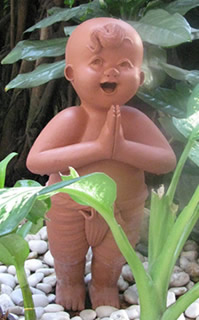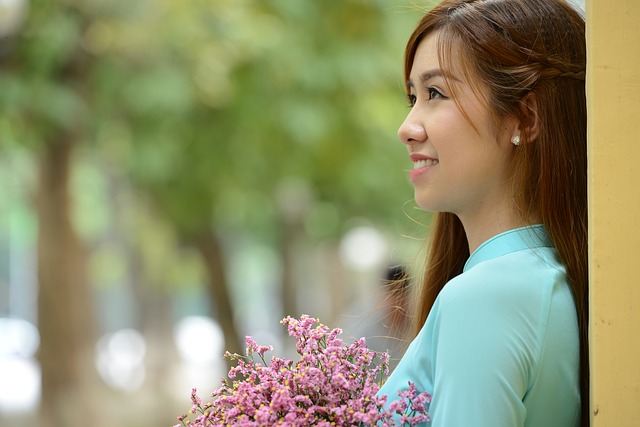As a foreigner in Thailand, you'll find yourself saying “Sawadee khrup/ka (hello)” a good 10 times a day, which is a good thing – because it means you're living in a friendly place, right?
On my walk to the MRT station of a morning, I have at least six “sawadee khrups” to complete on the way.
It goes something like this: My neighbour, the condo maid, security, the apartment block owner, the old lady who collects plastic, my fruit stall lady, and the hairdresser's in the salon where I get my head shaved.
This can easily extend to more if the ice cream man is around, if I pop into the restaurant downstairs or the ladyboy two doors down is stumbling in from the night before.

A “sa-wa-dee khrup” always provokes a smile 🙂
Don't get me wrong; it's not a chore – I enjoy the interactions.
The polite nature of saying “hello” with a smile to people you see regularly creates a sense of community, and as a foreigner makes me feel part of that community.
I have seen this same community spirit in all the areas I have lived in Thailand.
People don't have to say “hello”, but most go out of their way to do so, which is nice.
Of course there will come a point where you want to say a little more than just “hello” with those you see regularly.
And I guarantee many of the Thai people you come into contact with each day will want to say more to you too, even if just to be nosey and see what you do for work and who your girlfriend/boyfriend is.
This is a bit of a stumbling block if the only two things you can say are “Sawadee krup/ka”, and “Sabai dee mai khrup/ka”?
These two phrases get a little repetitive and somewhat boring for the recipient.
So, for those of you who don't speak much Thai, I'm going to arm you with 10 more Thai language sentences you can integrate easily into passing conversation.
This will improve your ability to speak Thai and help you develop friendships with the locals.
These are all common phrases and questions regularly used by Thais, and will help casual “hellos” blossom into light friendships.
Be sure to check out the video at the end to help with your pronunciation:
*BTW, as always, it's polite (necessary) to add “Khrup” (for a man) and “Ka” (for a lady) to the end of these questions/statements.
1. Ben yang ngai bang khrup/ka? – What's up? / what's going on?
เป็นอย่างไงบ้างครับ/คะ
This is similar to “Saibaidee mai khrup/ka” but less formal. It's a welcome alternative if you're kind of bored of the same “how are you” greeting.
This is the preferred way of asking someone you see on a regular basis: “What's been going on? / what's happening? / what's up?”
2. Mai jer gaan nan leuy khrup/ka! – I haven't see you for a long time!
ม่เจอกันนานเลยครับ/ค่ะ
This is a statement you'll want to use when you haven't seen a particular person around in a while. No doubt they'll be chuffed that you noticed they'd been gone a while.
3. Gin khao ruu yang khrup/ka? – Have you eaten yet?
กินข้าวหรือยังครับ/คะ
Sounds like a funny thing to ask someone after saying “hello”, right?
Not at all. In fact, at one time this was used as a primary greeting in Thailand.
You will regularly hear Thais ask friends and people they see daily around the neighbourhood whether or not they have eaten.
For Thai people, this similar to asking how someone is because it indicates that you care about their welfare.
If the answer is “Gin leow!” (Eaten already), you can follow up with, “Gin arai khrup/ka?” (What did you eat?)
When the person tells you what they ate, you might like to finish the conversation with, “Arroy mai khrup/ka?” (Was it delicious?)
This will get you a guaranteed chuckle and probably make someone's day: “The farang spoke to me and he can speak Thai!!”
4. Pai nai maa khrup/ka? – Where have you been?
ไปไหนมาครับ/คะ
This question is ideal in passing because you are able to enquire as to where the person is coming back from.
Of course, to ask where the person is going, simply cut out “Maa” and say “Pai nai khrup/ka”.
Again this is very commonly used among Thais, so you won't make yourself look silly in anyway.
When the person in question tells you where they've been, you might choose to answer by saying, “Oh, lor”. (Really, okay).
5. Wanee du dee jang leuy khrup/ka! – Today you look very good!
วันนี้ดูดีจังครับ/ค่ะ
This is quite a flattering statement, so don't over use it. Use it when a lady has changed her hair or has clearly made an effort to dress nicely.
If you are a woman saying this to a Thai man, perhaps reserve it for when you see a friend wearing a suit, rather than saying it to the security guard of your apartment, who may get the impression that you want to tickle his pickle!
6. Fon ja dok leow khrup/ka! – It's going to rain!
ฝนจะตกแล้วครับ/ค่ะ
An absolute favourite in the “Thai small talk” dictionary is commenting on the potential for it to rain, or the fact that it has already started.
Although you may recognise the word “Leow” on the end of this sentence as meaning “already”, the “Ja” before “Dok” (rain) means “will”. Literally translated, “rain will fall already”.
So if it looks like rain you can say, “Fon ja dok leow!” As you pass by.
7. Wanee rawn (lawn) jang leuy khrup/ka! – It's very hot today!
วันนี้ร้อนจังเลยครับ/ค่ะ
Yes, it's weather related again, which suits us Brits because all we talk about is weather and tea!
“Wanee” (today), “Rawn” (hot – often sounds like it starts with an ‘L' but in fact it's and ‘R' sound).
This is a great in and out statement that probably won't provoke the recipient to say much more than “Rawn”! At which point you can slip by and prepare your next encounter.
8. Wanee tam ngan mai khrup/ka? – Are you working today?
วันนี้ทำงานไหมครับ/คะ
It's always nice when someone takes an interest in what you are doing.
So you might use this question when you see a friend who looks like they might be off to work on a Saturday or Sunday.
If the person is working, the answer might be a short “Chai ka/khrub” with a slight frown to indicate mild discontent. Or, if they have a day off (Wan yuut”), they might smile (“Yim”) and say; “Wanee mai tam ngan khrup/ka”.
9. Khun nuai mai khrup/ka? – Are you tired?
คุณเหนื่อยไหมครับ/คะ
You might follow up by asking, “(Khun) nuai mai khrup/ka”, meaning “Are you tired?”.
This recognition of hard work will no doubt put you in the good books of the person you're speaking to.
You can drop the “Khun” (meaning “you”) if you like. Most Thai people will do the same, and simply say “Nuai mai khrub/ka”.
10. Leow jer gaan na khrup/ka! – See you later!
แล้วเจอกันนะครับ/คะ
No conversation is complete without saying goodbye. But rather than say “Goodbyeeee” in that familiar Thai adaptation, use “Leow jer gaan khrup/ka” for “See you later”, or “Jer gaan leow leow nee khrup/ka” for “See you soon”.
Here's the audio for all 10 questions and statements.
You will hear the English first and then you'll hear the Thai.
Last Updated on



wayne sund says
May 11, 2021 at 4:04 am
Jeanie Carr says
Thank you!
Mar 10, 2021 at 10:30 pm
TheThailandLife says
Mar 10, 2021 at 10:44 pm
Grace says
it would be best to disregard my comment if there's nothing wrong with both of your articles, I'm just stuck at home. Peace out. Let's hope for the CoViD-19 vaccine.
Aug 13, 2020 at 11:16 pm
TheThailandLife says
Aug 13, 2020 at 11:52 pm
Craig says
All countries are putting an effort in learning languages to participate in visiting .. good idea we all put an effort in to learn a little and you will find they will respect you more .. keep up the the good work ..
Feb 04, 2019 at 7:06 am
Peter Daniels says
Nov 09, 2017 at 3:01 pm
TheThailandLife says
Nov 09, 2017 at 5:21 pm
John says
Feb 14, 2017 at 11:55 am
David says
Dec 04, 2015 at 5:55 pm
TheThailandLife says
Dec 04, 2015 at 10:09 pm